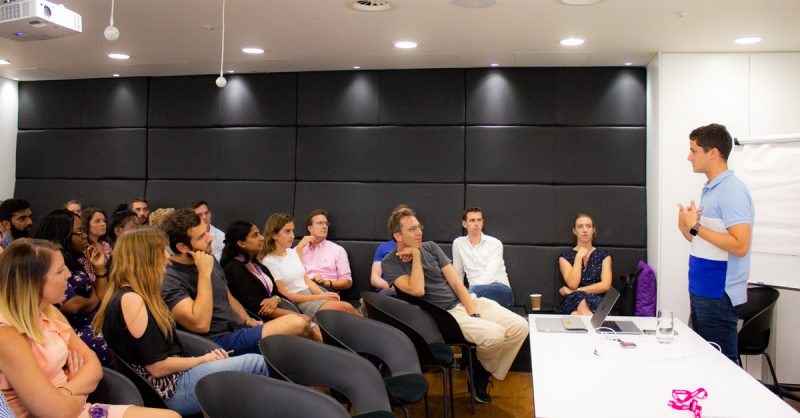Entrepreneur and Octopus Labs alumni Jesse Shemen tells us why he decided to leave Octopus and start building his own companies.
Since I graduated university, I’ve had my fair share of start-up attempts (mainly failures) to talk about. For example,
- A recruitment business that helps companies determine whether job candidates will be a good cultural fit, by getting references from the candidate’s social network.
- An enterprise digital asset marketplace – specifically for the investment and banking sectors – that allows users to monetise and sell digital assets such as fund pricing models.
- A language translation system that allows content creators seeking a global audience to post multiple versions of their videos onto video platforms like YouTube or Netflix.
First, it’s worth pointing out that I took each of these businesses very seriously. I quit my job with Octopus Labs to start the recruitment business. I even managed to convince myself and my wife it was the right thing to do. Out of the three businesses I experimented with, the first two failed and the third is still in its infancy, but is promising.

Serial entrepreneur Jesse Shemen talks to an audience of Octopus people, including Group CEO Simon Rogerson and Octopus Labs CEO Richard Wazacz.
So why did those first two companies fail? And what lessons did they present?
Of course, there were things I could have done differently, but the mistakes I made were the essential ingredients to make the third start-up more successful. There are three key ideas I would share with anyone that wants to work on their own venture.
Lesson 1: focus on the domain you know incredibly well
When you read TechCrunch every day, availability bias kicks in. You assume those outliers, the few really successful companies, are representative what it takes to build a thriving start-up. If you look at the most often-talked about tech companies, like Uber and Airbnb, it’s easy to trivialise the process of building a truly industry-changing business.
I myself fell into the trap. I had first-hand experience of companies struggling to retain staff over the longer term. It’s a well-known problem in recruitment – retention is really hard and it often comes down to culture or personality fit. I assumed that because there was a glaring issue I saw with my own eyes, I could immediately solve it
But the crucial issue was that I didn’t have a genuine understanding of the problem. Investor Chris Dixon refers to this as the ‘idea maze’ – you need to understand the history of a supposed idea and why it hasn’t been solved in the past. I clearly failed to do that. So, when it came to trying to convince recruitment professionals that my product was worth paying for, I didn’t have the proof or conclusive evidence to suggest the solution was going to work.
The point is, it’s much easier to notice a real and solvable problem if you know the domain really well, rather than casually observing a problem in an industry unrelated to you. I’m not claiming the latter isn’t achievable (it’s not like Brian Chesky from AirBnB was an expert in hospitality), but it’s noticeably more difficult.
Start with the problem, not the solution
Here’s my tip for anyone trying to solve a nagging problem – your first step should be working out what the problem is, instead of inventing a solution first. Paul Graham, the founder of Y Combinator, says it best: if you try to forge solutions or a product, “you get bad ones that sound dangerously plausible.”
“Ask yourself, what is it that you know – that little nugget of wisdom or insight – that isn’t commonly accepted in the world.”
Lesson 2: watch out for confirmation bias
Which leads to the second idea. When you’re building a business, you have to seek out evidence that runs counter to what you believe. We’re all susceptible to confirmation bias, in almost everything that we do. Because it’s instinctively uncomfortable to look for evidence that could suggest you’re wrong. But ignoring this evidence is the most dangerous thing a start-up can do. You’ll start to convince yourself that there is a demand for your product, when the reality is that customers don’t care.
I would spend lots of time asking potential customers whether they would be interested in a tool that would make their recruitment process quicker and more successful. They told me they would. And I took that as affirmation that this was proof of the business. But what I learned was the there’s a more sophisticated way of approaching the customer development process. It all starts with asking the right questions, and really figuring out whether the customer has a problem that you can address. Instead of asking people their thoughts and opinions on a solution that doesn’t exist yet, you can gain a lot more insight by asking fact-based questions and talking to people about the decisions they’ve already made.
Lesson 3: have a positive co-founder relationship
Getting on well with someone shouldn’t necessarily be the most important aspect of a co-founder relationship. What you most desperately need is a good diversity of skills.
In the first two businesses I explored, there was too much overlap in skills and experience between the founders. It might feel right because you have a fluid relationship, but it’s much more important to see if you’re productive. Importantly, as I mentioned, you want to make sure that at least one founder knows the domain you’re operating in really well. You’ll avoid a lot of costly mistakes.
It took a bit of time, but now I understand that building a start-up is about either proving or disproving some of the early theories you may have had. It’s incredibly hard to keep doing this with someone you agree with all the time and thinks the same way that you do.
“The litmus test to apply if you’re going to go into business with somebody is to ask yourself: who will I be most productive with?”
Applying these three lessons to my third start-up
My current start-up is a video translation tool. It’s called Papercup, and it allows video creators to reach a global audience.
We started out ten months ago by building the base product, then we went out proving that people actually wanted it and were willing to pay for it. Since then, we’ve recruited our initial team and should have up to ten people within the next few months. We know we have the ingredients for a great business, which is hugely exciting.
I don’t regret investing all that time and effort into the first two ventures. Papercup wouldn’t have even been possible with my attempts at the first two. I picked up a few things along the way:
- I learned what my role as a founder should be. And that I should not try and force myself into being the ‘domain person’ within the business.
- I worked out how to really understand why customers need something. Because ultimately that’s what matters. You should spend less time coming up with the solution, and spend more time thinking about the problem.
- I figured out who my ideal co-founder should be. I became more self-aware, recognising the skills and experience gaps that my co-founder should fill.
Taking the leap of faith that takes you from regular employment to the life of an entrepreneur is hugely challenging. You need to be a relentless optimist. You need to be the kind of person who can actively seek out criticism and grow stronger from setbacks and rejection. It is hard work and it can at times be very lonely and isolating. And you have to be able to execute really well, because in the beginning, it’s all down to you.
I’ll be the first to admit that when I started I didn’t know what I was doing. But I learned that’s okay, because anyone who starts anything important doesn’t know what they are doing either. So, embrace your lack of knowledge and start mastering new concepts and ideas. It doesn’t matter if your start-up fails, because failing will help you figure out how to make your next venture successful.
Jesse Shemens is founder and CEO of Papercup.


